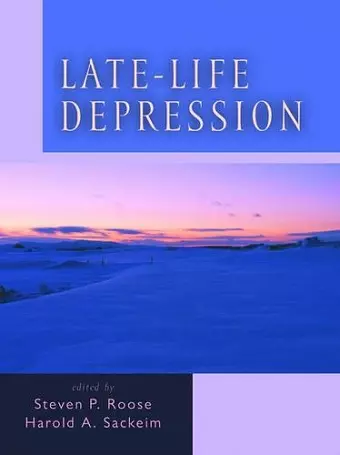Late-Life Depression
Steven P Roose editor Harold A Sackeim editor
Format:Hardback
Publisher:Oxford University Press Inc
Published:12th Aug '04
Currently unavailable, and unfortunately no date known when it will be back

We live in an ageing world. Illnesses that are prevalent and cause significant morbidity and mortality in older people will consume an increasing share of health care resources. One such illness is depression. This illness has a particularly devastating impact in the elderly because it is often undiagnosed or inadequately treated. Depression not only has a profound impact on quality of life but it is associated with an increased risk of mortality from suicide and vascular disease. In fact for every medical illness studied, e.g. heart disease, diabetes, cancer, individuals who are depressed have a worse prognosis. Research has illuminated the physiological and behavioural effects of depression that accounts for these poor outcomes. The deleterious relationship between depression and other illnesses has changed the concept of late-life depression from a "psychiatric disorder" that is diagnosed and treated by a psychiatrist to a common and serious disorder that is the responsibility of all physicians who care for patients over the age of 60. This is the first volume devoted to the epidemiology, phenomenology, psychobiology, treatment and consequences of late-life depression. Although much has been written about depressive disorders, the focus has been primarily on the illness as experienced in younger adults. The effects of ageing on the brain, the physiological and behavioural consequences of recurrent depression, and the impact of other diseases common in the elderly, make late-life depression a distinct entity. There is a compelling need for a separate research program, specialized treatments, and a book dedicated to this disorder. This book will be invaluable to psychiatrists, gerontologists, clinical psychologists, social workers, students, trainees, and others who care for individuals over the age of 60.
This is an important book. it will become the standard reference book for all major topics under the rubric of late-life depression. * International Journal of Geriatric Psychiatry, Vol 20 *
An outstanding 388-page textbook dedicated to the subject of depression in the elderly. What is remarkable about this book is that it strives to use an evidence-based approach to describe illness models and clinical treatments . . . an excellent textbook that can be used as a clinical resource, a study aid for the boards, or a review of the evidence-based research in late-life depression. * Journal of Clinical Psychiatry *
This book is "state of the art" . . . The editors have brought together many of the leading researchers in the field to assemble an authoritative reference that will be useful for students, residents, practicing physicians, and mental health professionals in related fields. For a multiauthored textbook, Late-Life Depression is well organized, appropriately succinct, and clear. Those qualities in themselves are accomplishments. The great strength of the book is its medical and biologic orientation . . . It will serve as an excellent resource for those seeking to understand the clinical varieties of the condition, relevant pathobiologic theories and correlates, and approaches to treatment. * New England Journal of Medicine *
ISBN: 9780195152746
Dimensions: 218mm x 282mm x 28mm
Weight: 1395g
420 pages